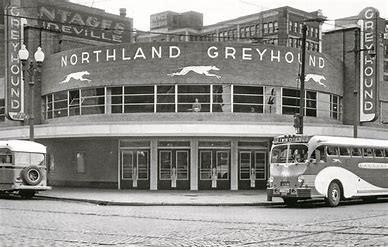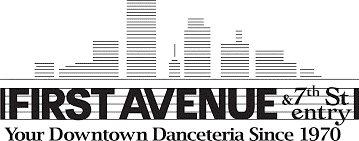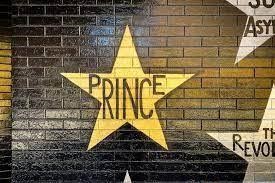First Avenue & 7th Street Entry
1937, 1970, 1981
PDF of the First Avenue & 7th Street Entry History
The building now known as First Avenue was erected in 1937, at 701 First Avenue North, as the Greyhound Bus Depot. The depot was owned by Greyhound Lines, a company founded in Hibbing, Minnesota. The depot served as an important regional transit hub for over 30 years until it relocated elsewhere in 1968.
The building was designed by Lang & Raugland and constructed in the Art Deco style. The exterior consisted of a curving façade of shiny blue bricks with white trim. The interior was striking with a checkered terrazzo floor and chrome chandeliers. The original bus depot boasted modern amenities that were unusual for public buildings at the time, including air conditioning, public telephones, and shower rooms.
 Allan Fingerhut, a member of a famous Minnesota merchandizing family, purchased the depot site in 1970. He partnered with Danny Stevens, the frontman of the local rock band Danny’s Reasons, who possessed a liquor license. Together they converted the site into a nightclub venue.
Allan Fingerhut, a member of a famous Minnesota merchandizing family, purchased the depot site in 1970. He partnered with Danny Stevens, the frontman of the local rock band Danny’s Reasons, who possessed a liquor license. Together they converted the site into a nightclub venue.
Over the next decade, the nightclub went through several iterations. Initially, it was a nightclub called The Depot featuring live rock and roll music. The first concert at this new venue featured Joe Cocker and Mad Dogs & Englishmen. With disco overtaking rock and roll in the early 1970s, The Depot gave way to Uncle Sam’s, featuring recorded disco music and DJs. Uncle Sam’s was a franchisee of American Events Company (AEC) with Steve McClellan serving as general manager and Jack Meyers handling finances. The interior of Uncle Sam’s was remodeled with a patriotic theme in red, white, and blue colors. As disco waned in popularity, so did AEC’s interest in the venue. In 1980, AEC sold the building back to Fingerhut who partnered with accountant Byron Frank. They shortened the name of the nightclub simply to “Sam’s” and jettisoned the disco theme.
On New Year’s Eve of 1981, the nightclub was rechristened “First Avenue.” Over the years, First Avenue became a premiere nightclub featuring live rock and roll music. First Avenue hosted many national acts including The Ramones, Pat Benatar, U2, R.E.M., New Order, and Nirvana. First Avenue also hosted popular Danceteria events on weekends, drawing big crowds.

Meanwhile, the former cafeteria area of the old bus depot was converted into 7th Street Entry which featured up-and-coming local bands. 7th Street Entry opened on March 21, 1980, with local rocker Curtiss A. headlining. The 7th Street Entry is smaller than First Avenue (capacity of 250), while First Avenue has a capacity of 1,5000. The Entry space was once a restaurant (the “Greyhound Cafe”) and later a coatroom. Danny Flies and McClellan spent $1,500 to turn it into a barebones music venue as part of Sam’s. The Entry opened its doors on March 21, 1980, with Cathy Mason fronting Wilma & the Wilburs, who were first to play, as a warmup for headliner Curtiss A.
 The performer who came to personify First Avenue’s growing reputation was Minneapolis’ own Prince Rogers Nelson. Until 1980, the Twin Cities nightclub scene was quite segregated. First Avenue broke that barrier by booking several Black artists, including Prince. The first Prince concert at the venue occurred in 1981 when it was still called Sam’s. In 1983, Prince recorded concert footage at First Avenue for the film Purple Rain. In all, Prince gave nine concerts at First Avenue, all major events drawing big crowds and, on occasion, the police.
The performer who came to personify First Avenue’s growing reputation was Minneapolis’ own Prince Rogers Nelson. Until 1980, the Twin Cities nightclub scene was quite segregated. First Avenue broke that barrier by booking several Black artists, including Prince. The first Prince concert at the venue occurred in 1981 when it was still called Sam’s. In 1983, Prince recorded concert footage at First Avenue for the film Purple Rain. In all, Prince gave nine concerts at First Avenue, all major events drawing big crowds and, on occasion, the police.
Several other notable events became associated with First Avenue. Alt-country star Lucinda Williams was married on stage after a performance in 2009. Minnesota band Trampled by Turtles released Live at First Avenue in 2010. More than 400 stars on the exterior of the First Avenue building honor acts who have performed there.
First Avenue filed for bankruptcy and temporarily closed in 2004. It reopened two weeks later with Byron Frank as the primary owner and a management team consisting of Frank, McClellan, and Meyers. Byron Frank’s daughter Dayna Frank became principal owner and manager in 2009.
In the following decade, First Avenue Productions expanded its entertainment empire into additional venues. Acquisitions included Turf Club (2013), Palace Theater (2017), Fitzgerald Theater (2018) in St. Paul, and Fine Line Café (2018) in Minneapolis.
First Avenue is widely recognized as one of the most iconic nightclubs in the United States.
